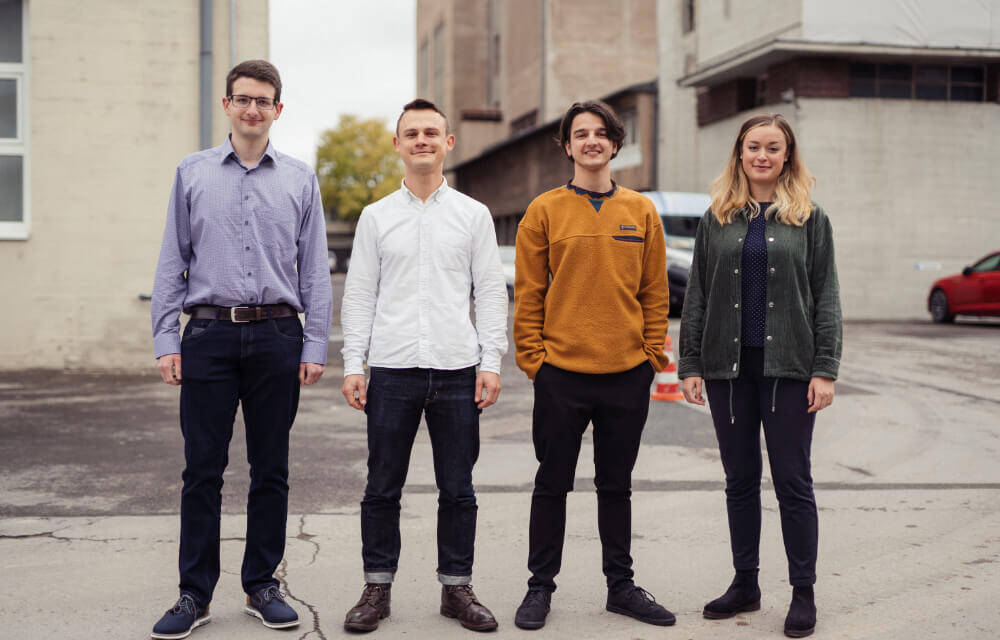Student project at Saarland University receives high federal funding

The inventors of the "Watchdog" and graduates of Saarland University Alexander Fink, Roman Tabachnikov and Marius Bleif with their newest team member Klara Weise. ©Team Bitahoy
The master’s program “Entrepreneurial Cybersecurity” at Saarland University combines cyber security and computer science with founding an own company. The aim is to to make current research topics feasible for the market. A project of the first students who graduated from the program will be funded by the German Federal Ministry of Education and Research (BMBF) for one year with about half a million Euros.
Roman Tabachnikov, Marius Bleif and Alexander Fink developed during their studies at Saarland University a “watchdog” for home networks” . Their “watchdog”, a computer the size of a cigarette box, uses algorithms of machine learning and artificial intelligence to learn the “normal behavior” of networked household devices. If a device deviates from this, the “watchdog” alerts the owner. The system makes a valuable contribution to the security of smart homes and to informational self-determination in digitalized and networked living, according to the announcement by the German Federal Ministry of Education and Research on funding for the project.
“Our goal is to offer a ready-for-market product by the end of 2021,” says Roman Tabachnikov, one of the three inventors of the “Watchdog”. A test run is planned for the beginning of next year. “This product test is open to households that have devices connected to the Internet, such as vacuum robots, smart TVs or the like. Participants will be provided with a preliminary version of our device and can give feedback on its usability and functionality,” explains Tabachnikov. Registration can be done online, participation is free of charge.
The “Watchdog” was created as part of the “Entrepreneurial Cybersecurity” course of study at Saarland University. The project is now being funded for one year with around half a million euros within the “StartUpSecure” initiative of the German Federal Ministry of Education and Research. The three students were supported in the development of their business idea by the start-up incubator of the Cispa – Helmholtz Centre for Information Security.
A detailed press release about the study program “Entrepreneurial Cybersecurity” including a presentation of the project “Bitahoy Watchdog” can be found at
https://saarland-informatics-campus.de/en/piece-of-news/start-a-company-as-part-of-your-studies-the-study-program-entrepreneurial-cybersecurity/
Further information:
About the “StartUpSecure” initiative: https://www.forschung-it-sicherheit-kommunikationssysteme.de/foerderung/bekanntmachungen/startup-secure
About the funding of Bitahoy by the BMBF: https://www.forschung-it-sicherheit-kommunikationssysteme.de/projekte/bitahoy
Background Saarland Informatics Campus:
800 scientists and about 2000 students from more than 80 nations make the Saarland Informatics Campus (SIC) one of the leading locations for computer science in Germany and Europe. Five world-renowned research institutes, namely the German Research Center for Artificial Intelligence (DFKI), the Max Planck Institute for Computer Science, the Max Planck Institute for Software Systems, the Center for Bioinformatics and the Cluster for “Multimodal Computing and Interaction” as well as Saarland University with three departments and 21 degree programs cover the entire spectrum of computer science.
Editor:
Philipp Zapf-Schramm
Competence Center Computer Science
Saarland Informatics Campus
Phone: +49 681 302-70741
E-Mail: pzapf@mmci.uni-saarland.de
Die Öffentlichkeitsarbeit am Saarland Informatics Campus wird unterstützt durch das Kompetenzzentrum Informatik Saarland, gefördert aus Mitteln des Europäischen Fonds für regionale Entwicklung (EFRE) und Mitteln der Staatskanzlei Saarland.


